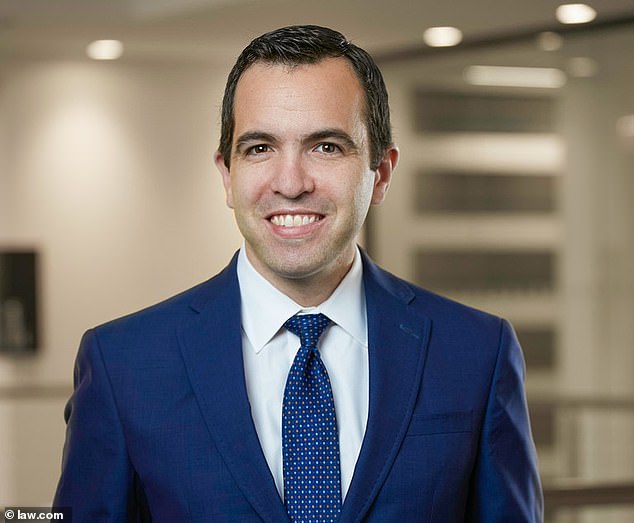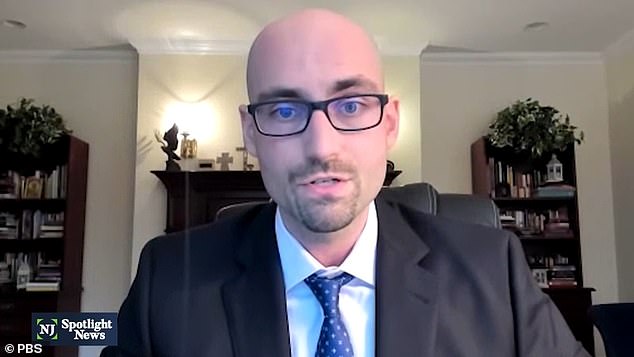Father sues New Jersey school district over ‘student-centered’ transgender policy allowing children to change names and pronouns without parental consent: ‘It’s so out of whack’
A parent of three children in a New Jersey school district is suing the system over a policy that doesn’t notify parents when transgender students change their names or preferred pronouns.
The federal lawsuit, filed in the United States District Court for the District of New Jersey, names Cherry Hill Public Schools as a defendant and comes from concerned father Rick Short.
He claims the guidelines, modeled after state policy, violate his rights as a parent and is seeking to rescind the policy or add a provision requiring parental involvement.
Cherry Hill, the twelfth largest system in the state, is the latest New Jersey school district to be drawn into the battle over parental notification and LGBTQ+ policies in the state, with several of the nearly 600 public school districts adopting the policy.
Rick Short – a father of three children enrolled in the Cherry Hill School District, claims the guidelines, modeled after state policy, violate his rights as a parent, and is seeking to repeal the policy or add a provision encouraging parental involvement

Cherry Hill Public School, the twelfth largest system in the state, consists of 18 schools from preschool through high school
Short, a father of four who previously ran for city council, filed the suit on Oct. 12, also naming the state DoE as a defendant.
It comes as the policy, known as Policy 5756, has come under criticism from parents and even some districts.
In comments on The Philadelphia InquirerShort spoke a bit about the lawsuit, but also about some of his doubts about the “student-centered” transgender policy.
“I don’t agree with the policy,” Short told the newspaper Tuesday, because three of his four children are still enrolled in one of the district’s 18 schools.
“To me it’s so strange that a parent doesn’t have the right to know what’s going on in their child’s life,” he continued about the guidance.
“I just want to know.”
Under the policy, which was adopted in 2019, “a transgender student will be addressed at school by the name and pronoun chosen by the student, regardless of whether there has been a legal name change or a change in official school records.”
Barbara Wilson, a spokeswoman for the school district, reportedly declined to comment when The Inquirer asked Tuesday about the threatened lawsuit. She told the publication that the system does not talk about pending lawsuits.
Attorneys for Short, meanwhile, argued in their filing that the policy violates the father’s Fourteenth Amendment rights — which allow him to direct decisions about the care, education and health care of his school-aged children.
In a conversation with PBS last Friday, attorney Tom Stavola elaborated on that argument.
“The legal constitutional basis is that this infringes on parents’ substantive due process rights (the Fourteenth Amendment) to direct the medical care and health care decisions of their children,” Stavola explained.
“We allege here that for the plaintiff, the parent in this case, who has three children attending Cherry Hill High School, this policy unconstitutionally violates his right to direct the care, education and medical decisions of his children.

Short, a father of four who previously ran for city council, filed the suit on Oct. 12, also naming the state DoE as a defendant. Short has two daughters and a son enrolled in the district, who he said is a freshman and has never identified as transgender

In June, New Jersey Attorney General Matthew J. Platkin filed civil rights complaints seeking to block four New Jersey public school districts from implementing similar policies based on claims that they discriminate against LGBTQ+ students.

Attorneys for Short, meanwhile, argued in their filing that the policy violates the father’s Fourteenth Amendment rights — which allow him to direct decisions about the care, education and health care of his school-aged children. Pictured is one of his attorneys, Tom Stavola
Short has two daughters and a son enrolled in the district, the latter of whom she said is a freshman and has never identified as transgender.
“I would know because he would tell me,” he told the newspaper, adding that he is even less concerned about his older daughters.
“The federal lawsuit was more or less from my son,” said Short, who has an adult daughter who recently graduated from school in the system.
“I don’t know why,” he added. “I think because he was a freshman.”
The case is now set to be heard by a judge in the state’s Third Circuit — and could pave the way for a possible Supreme Court case in the event of a loss and some subsequent appeals.
Short plans to argue that his children could be psychologically harmed and forced to live a double life due to district guidelines by being forced to hide their gender identity from him and their mother.
As said, tThe policy, one of many seen in other states such as Maryland, is drawing increasing criticism from parents and activists alike, with district officials even questioning it and refusing to adopt it.
Earlier this year, three districts in Monmouth County and one in Morris adopted or changed parental notification policies put in place thanks to New Jersey state laws — laws that require educators to out students based on their gender identity.
In townships like Hanover, Middletown and Marlboro – along with the Manalapan-Englishtown Regional Boards of Education – officials ruled that staff must now notify parents when gender-nonconforming students want to change their names, adopt new pronouns called or other similar things. accommodations.
In June, New Jersey Attorney General Matthew J. Platkin filed civil rights complaints seeking to block the four districts from implementing the policy, based on claims that they discriminate against LGBTQ+ students.
He also used children’s mental health to bolster his argument, saying that ignoring such guidelines could threaten the mindset of minors.
In August, the Supreme Court issued a preliminary injunction banning the new policy in the four counties, preventing it from taking effect while the cases made their way through the state’s federal court system.
All of the October cases are currently still pending, but could provide a precedent for Short’s newly filed lawsuit, which is also ongoing.
If the Cherry Hill case before the Third Circuit moves forward, experts say it could be used as an argument for removing the policy from state law entirely.
While the Supreme Court has established that the rights of parents are important.
There is a whole other set of cases that deal specifically with children’s rights and with the state’s duty and interest in protecting the physical and psychological well-being of a minor.
It also echoes a ruling recently presented to the Fourth Circuit Federal Court of Appeals in Maryland, where a judge ruled that parents who filed similar complaints did not have the necessary legal standing. He dismissed the case citing that neither parent had children who were members of the transgender community.
